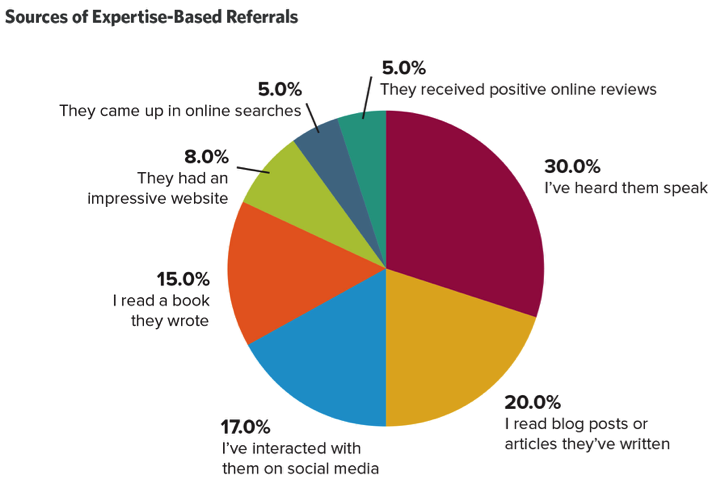
Referrals are widely seen as the surest and most direct route to new business for professional services firms. In fact, the majority of businesses (61.9%) in a Hinge Research Institute study last year, considered generating more referrals as a key focus of their marketing efforts. The importance of referrals for these firms was reinforced by the fact that 47.8% of firms said they would dedicate external marketing resources to the effort.
So what are the top strategies for getting referrals? Well, first you need to understand what is required to not only get more referrals, but how to keep them.
Getting More Referrals
While getting more referrals may seem straightforward, it’s actually anything but. In fact, many of the most often recommended approaches, such as asking for referrals, attending networking events and sponsorships, are simply ineffective.
Keeping the Referrals You Get
To make matters worse, referrals can easily be lost. More than 52% of people referred to your firm may rule you out before even speaking with you. The biggest reason is because they couldn’t figure out how you could help them. Poor websites and weak online content also play major roles.
So let’s review the top 5 strategies that have proven effective for professional services firms.
1. Showcase successful high-profile projects
Most referrals come from someone who has asked for a referral from a one of your clients or a someone familiar with your work.
So one of the strategic keys to the referral kingdom is getting more people to ask them. How? By showcasing you work in presentations with your client, developing compelling case studies, profiling the successes of clients on your website, or publicizing high profile engagements.
This strategy has an added benefit of helping potential clients understand how you can help them.
2. Have in-house experts speak at conferences and trade shows
High-profile experts draw referrals. That’s why speaking at events is perhaps the singe best opportunity for generating the highly coveted referral. Why? Because speaking engagements expose your expertise to a wider audience.
Just make sure the audience is filled with prospects or influencers. There’s no point in talking at events that don’t attract your target market. Appearances at trade shows are particularly good because they draw high concentrations of professionals from a specific industry.
3. Invest in a high-quality professional website
Remember that heart-stopping statistic that you may be losing 52% of the people referred to you because they weren’t sure how you could help them? Well here is another data point to remember: more than 80% of prospects check out your website before they decide to hire your firm.
Kind of underscores the importance of a good website, doesn’t it? So develop a website that helps prospects easily understand what you do, who you do it for and why they should work with you.
Of course, your website can be a source of referrals in it’s own right as illustrated in the figure below.

4.Generate high-quality educational content
This strategy goes hand-in-hand with #3. With a solid website, you’ll need content. That content can take the form of blog posts, articles, white papers, executive guides, webinars, etc.
High-quality educational content is a concrete way of demonstrating your firm’s expertise and a common way for people to learn about your firm. And if people learn about your firm, they can share what they know with others.
5. Be at the forefront of industry trends
People want to work with firms that are up to date with their industry – even better if they’re driving the field forward. In many ways, the other strategies of speaking engagements and educational content communicate this sort of thought leadership.
But be prepared to go beyond simply repeating consensus. Thought leadership means having a new perspective or being ready to add useful insight. One great technique is to conduct original research – this gives you something to talk about and adds new perspective to the discussion.
Turn Your Referral Marketing Strategy Into Action
A great strategy will produce no results if it’s not implemented, which happens far too often with referral marketing. Many start with good intentions and an ambitious schedule of meeting with clients and referral sources. But a few weeks in and you hear a chorus of “I’m too busy.”
The trick is to develop a strategy that is sustainable. Referrals are not free. They require sustained focus if you are to stand out in the crowd.

